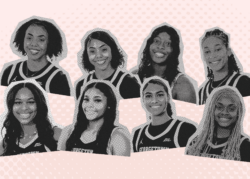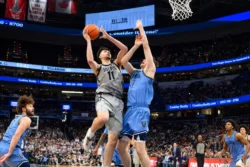Make no bones about it: I’m a ridiculous sports nerd. On a rough estimate, I’d say about 90 percent of my waking hours are spent watching sports, playing sports, playing sports in video game form, writing about sports, talking about sports or reading about sports. Rather than filling my brain with important, meaningful knowledge or even knowledge I might use for schoolwork, my memory is clogged with the likes of on-base percentages of fifth-string outfielders all over major league baseball and the heights and weights of every kicker in football. For whatever silly reason, sports mesmerize me, and I’ve dedicated my life to them. In high school, I was a ridiculous, football-playing sports nerd. In college, I’m a ridiculous, sports-reporting sports nerd.
Recently, while studying potential late-round picks in the upcoming NFL Draft, I came across one line of stats that brought back a whirlwind of emotion and physical pain that I hadn’t felt since my sophomore year of high school. The line: Ryan Fletcher, DT, Hofstra, 6-foot-2, 290 pounds.
To fellow sports nerds like Mel Kiper Jr., Ryan Fletcher is a 23-year-old fifth-year senior defensive tackle from Hofstra. They know about how his outrageous physical ability earned him All-America honors for Division I-AA. What they don’t know, however, is what it feels like to be crouched in a three-point stance two feet away from him, staring into his intimidating, tinted visor, hearing his heavy breath and almost feeling his intense desire to maim and destroy the opposing quarterback after crushing anything that got in his way. Mel Kiper Jr. doesn’t know what that’s like. I do.
In my sophomore year of high school, a combination of my own mental ability (I was the only one who could remember the plays) and my high school football team’s lack of overall ability, rendered me the starting center of our offensive line. My rookie season was flowing along smoothly until the fifth week, when we were to face Glen Cove, and, most notably, their returning All-County nose tackle, the aforementioned Ryan Fletcher. Since the nose tackle lines up directly over the center, the week was designated for training me on how to perform against a physical mismatch akin to Steve Kerr trying to post up on Shaquille O’Neal. Ryan Fletcher had five inches and 100 pounds on me, and he was much faster. I spent the entire week practicing blocking both the fastest kid on the team and the biggest kid on the team and stayed hours after each long practice working out in the school’s dungeon of a weight room. No amount of preparation, however, could prepare me for what was in store.
By 4 p.m. on Saturday, Ryan Fletcher had scored four touchdowns. I’m pretty sure he had something like six sacks, two interceptions and a fumble recovery. Everyone who watched the game agreed that it was probably the most dominating single player performance in Long Island football history. After the game, I watched nearly in tears while Fletcher was posing for newspaper pictures in an end zone that he had already spent so much time in. All of my efforts?my work, my determination, my “Rocky” story?were for naught. I had been physically dominated, and nothing I could have done would have ever stopped Ryan Fletcher.
As I was walking to the bus to return home, I felt a tremendous weight on my shoulder pads. I looked to my right to realize that it wasn’t metaphorical, but a tremendous hand that led to a tremendous arm that led to a tremendous man, Mr. Ryan Fletcher himself. “Hey, seventy-three,” he said. “Good game, man. You wore me out.”
Maybe Ryan Fletcher was just being a nice guy, just feeling bad for someone who had granted him the performance of a lifetime. But I like to think that he saw something else in me, something that we had in common. I hope that Ryan Fletcher recognized the desire and dedication that I put towards my impossible dream of stopping him, and acknowledged it as the same devotion to football, and sports in general, that ran in him.





